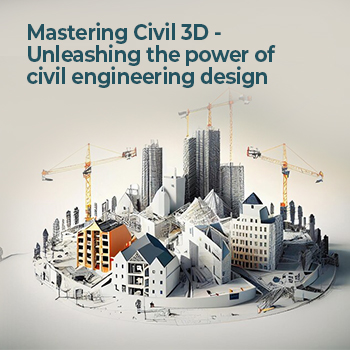
Why Enroll in a BIM Course: Unlocking Career Opportunities with CAD Dubai
In the ever-changing world of civil engineering, Building Information Modeling (BIM) is making a big impact. BIM is transforming how we plan, design, build, and manage structures and infrastructure. Big companies want engineers who know BIM well. Architects and engineers can find exciting and well-paying jobs in this field. If you want to boost your career, taking a specialized BIM course from institutions like CAD Dubai is a smart move. It will teach you a lot about BIM and give you valuable skills and knowledge.
BIM's Transformative role in construction
Over the last two decades, Building Information Modeling (BIM) has revolutionized the construction industry. It started as a tool for collaboration and 3D modeling, making projects more efficient and error-free. As it evolved, 3D modeling became standard, allowing stakeholders to visualize projects accurately, reduce misunderstandings, and identify issues before construction. The integration of cloud technology enabled real-time collaboration and data management, enhancing efficiency and reducing costs. Digital twins, representing virtual replicas of buildings, brought predictive maintenance, optimization, safety improvements, and comprehensive lifecycle management.
Looking forward, the future of BIM is poised for even more exciting developments with the integration of artificial intelligence (AI) and automation. AI will enable generative design and data-driven decision-making, while automation will bring robotics and 3D printing into construction guided by BIM data. In summary, BIM has significantly improved construction practices, and its future holds great promise, shaping the industry in remarkable ways through AI and automation.
In-Demand Skill Set
Enrolling in a Building Information Modeling (BIM) course provides a valuable skill set for construction and architecture. Students learn to use BIM software, create 3D models, and collaborate effectively. They gain skills in data management, project coordination, cost estimation, and energy-efficient design. BIM courses cover regulatory compliance, adaptability to industry software, problem-solving, and quality control. Students also learn about risk management, documentation, and leadership. These skills open doors to various career opportunities in project management, design, consulting, and more, making BIM training a smart investment for a successful career in these fields.
Efficiency and Cost Savings
BIM streamlines large projects, making them quicker and simpler. It also helps in cost analysis by providing accurate estimates for materials and labor early on. This cost efficiency is further enhanced by automating tasks and visualizing the project, which aids in planning and problem-solving, ultimately saving time and money.
Career Advancement Opportunities
Enrolling in a Building Information Modeling (BIM) course offers great career prospects. BIM pros are in high demand, and there are diverse career options like BIM manager, project manager, or consultant. BIM training gives a competitive edge in the job market, often leading to higher salaries. It opens doors globally, and with experience, you can move into leadership roles. BIM keeps you updated on industry tech, making you a sustainability expert, and even a consultant. As BIM becomes standard, it provides long-term career stability. In a nutshell, BIM training boosts your career in construction and architecture.
BIM professionals have various job roles, such as BIM Managers who oversee BIM in organizations, BIM Coordinators who manage project collaboration, Design Architects for 3D modeling, Structural Engineers for building strength, MEP Engineers for systems, Project Managers who use BIM for efficiency, Sustainability Specialists for eco-friendly designs, and BIM Consultants who provide expertise to clients. Career paths start with entry-level roles, progress to senior specialists, and can lead to management, specialization, or even self-employment as a consultant. BIM offers a dynamic field with lots of growth potential for those who invest in their skills.
Adaptation to Industry Trends
Staying current with industry trends in Building Information Modeling (BIM) and construction is vital for several reasons. Firstly, the construction field is rapidly evolving with new technologies, making it crucial for BIM professionals to keep up. This knowledge provides a competitive edge, making professionals more appealing to employers and clients. It also leads to increased efficiency and productivity. Meeting client demands is easier when professionals are up-to-date, which can boost their reputation.
Staying informed about changing regulations and sustainability practices is essential. Global collaboration is more common, and understanding international trends aids in cross-border projects. It can also lead to career growth, better risk management, and valuable networking opportunities. Being adaptable to industry changes helps professionals weather economic shifts and fosters inspiration and creativity.
Conclusion
BIM education plays a crucial role in helping professionals adapt to the ever-evolving landscape of construction technologies. But what makes it more crucial is the institution you are choosing for your BIM studies. It provides a strong foundation in BIM software, making it easier for individuals to grasp and integrate new tech tools. Moreover, BIM education instills a culture of continuous learning and an adaptive mindset, fostering openness to embracing emerging technologies in the construction industry. Professionals learn how to seamlessly integrate various software and tools, handle extensive data efficiently, and enhance their problem-solving abilities.





 Testimonials
Testimonials Video Testimonials
Video Testimonials News & Events
News & Events Course Enquiry
Course Enquiry Achievements
Achievements Job Opportunities
Job Opportunities Image Gallery
Image Gallery Video Gallery
Video Gallery Overview
Overview Vision Mission
Vision Mission Collaboration
Collaboration Careers
Careers Contact Us
Contact Us






